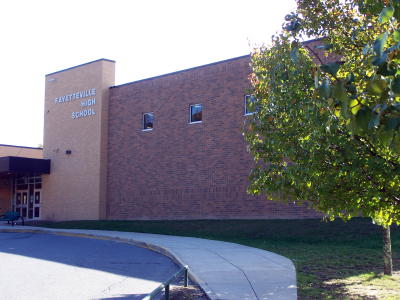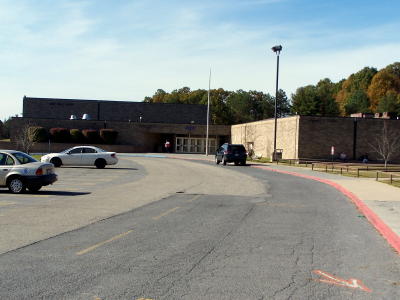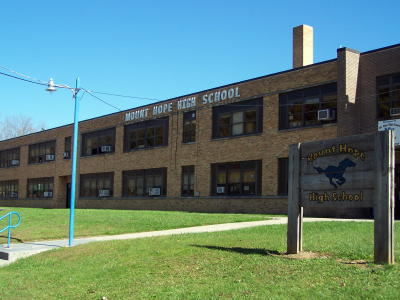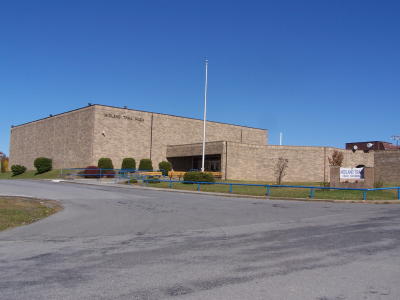FAYETTE VOTERS SOUNDLY DEFEAT CONSOLIDATION EFFORT - "Fayette County Wants Community Schools"

By Bob Weaver
Fayette county voters didn't like a consolidation effort proposed by county school officials, voting 3-1 against a $49 million dollar bond that would have built a new Fayette Plateau High School near Fayetteville.
Seventy-seven percent of Fayette voters said no.
Reports say the price of the 50-acre farm on which the new school would have been built has risen from about $500,000 to several millions.
The new school would have had about 1,600 students, far exceeding guidelines adopted by some states like Florida, which is limiting the size of new high schools to 900 students.
 Carolyn Arritt (pictured left) Challenge WV fellow, retired Fayette teacher with 34 years service and former school board member, said "There is little evidence of academic improvement with such consolidation, and many parents feel the safety and social needs of children are best addressed in their communities."
Carolyn Arritt (pictured left) Challenge WV fellow, retired Fayette teacher with 34 years service and former school board member, said "There is little evidence of academic improvement with such consolidation, and many parents feel the safety and social needs of children are best addressed in their communities."
"Consolidation in West Virginia has meant that many students will be spending much of their day riding a school bus," said Arritt.
It is not uncommon for students to be on a bus well over the state's one hour guideline, and in many cases, students are on a bus exceeding one and one-half hours each way.
Challenge WV Executive Director Thomas Ramey has called it "A crime against children and education," particularly with pre-kindergarten students now being transported.
The proposal would have closed four high schools, Mount Hope, Fayetteville, Oak Hill and Midland Trail.
The state's School Building Authority had committed $22 million to the $49 million bond for the new school project, although some of the money would have gone to upgrade other school buildings.
 Citizen activist Randall Patterson (pictured left) a retired Fayette County principal and administrator, said "In larger schools, marginal students get lost. When students have problems in smaller community schools, their needs are recognized and addressed."
Citizen activist Randall Patterson (pictured left) a retired Fayette County principal and administrator, said "In larger schools, marginal students get lost. When students have problems in smaller community schools, their needs are recognized and addressed."
Patterson said keeping children in community schools would have gained support for the bond, with Fayette county residents nearly always supporting public education with a levy.
He said a primary reason given to supply the bond was improved curriculum, which connects to improving academic performance.
"The largest high school in the county, Oak Hill, already has the lowest test scores," Patterson said.
Leland O'Neal, a certified public accountant, a leader against the bond, said "Fayette County wants community schools. They're not against education."
"This plan was an ill-conceived plan to spend taxpayer money," said O'Neal, noting that over 70% of current property taxes helps finance the school system.
O'Neal says Fayette County school administration does "not properly budget maintenance and repair for school buildings," most of which have been built since the 1970s.
"They let the buildings run down and cut back on curriculum," O'Neal said.
Matt Edwards, former Fayette superintendent for 14 years, said "A large body of research...overwhelmingly affirms the superiority of the small school."
"It is often assumed that large schools are cheaper to operate and provide richer curricula than small schools. Studies show that neither of these things are necessarily true," Edwards said.
It will be 2011 before Fayette schools has another chance at receiving state assistance for school improvement and construction projects, said Dr. Mark Manchin, executive director of the state School Building Authority.
Manchin said, "The smart thing to do is try to bring everybody back together and don't allow this to be divisive...and come back with a plan everyone can support.
Challenge WV executive director Thomas Ramey said "The nation has been moving back to community school models, while West Virginia is still going in the other direction."

Fayetteville High School

Oak Hill High School

Mt. Hope High School

Midland Trail High School